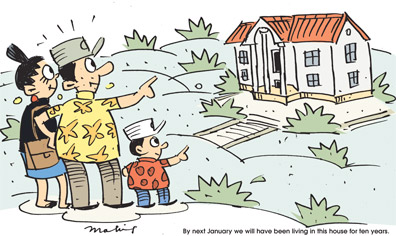|

by R. S. Karunaratne
Future perfect continuous tense
|

By next January we will have been living in this house for
ten years. |
We form the future perfect continuous tense in the following way:
Will / shall have been + present participle for the first person.
Will have been + present participle for the other persons.
Like the future perfect tense, the future perfect continuous tense is
also used with a time expression beginning with by.
By the end of this year the king will have been ruling the country
for 30 years.
By the end of the month Raja will have been changing jobs for twenty
years.
The future perfect continuous tense indicates that an event will be
in progress at a
particular time in the future and additionally highlights the duration
of the event.
By next week the tourists will have been occupying the hotel for ten
days.
By next January we will have been living in this house for 10 years.
By the end of this year, I shall have been working for this company for
25 years.
[Activity]
Underline the correct words to complete the passage. Check your
answers with the key.
Mendis and Sathya (1) have always hoped / are always hoping that
their children (2) will do / won’t do their studies well and ultimately
(3) pursue / pursued the careers of (4) their / there choice. So far,
Harendra, the eldest child (5) hasn’t / haven’t let them down. He (6)
has won / is winning prizes both in academic activities and sports. At
present, he (7) is / was a law student. Everyone in the family (8) think
/ thinks highly of him. Opinions (9) differ / are differing dramatically
when the family members (10) has referred to / refer to Amanda, the
youngest child.
Key:
1. have always hoped 2. will do 3. pursue 4. their 5. hasn’t 6. has
won 7. is 8. thinks 9. differ 10. refer to
Quiz on Greek word parts
We form English words from Greek word parts. For instance, the Greek
word ‘logos’ means ‘word’. ‘Logos’ has now been converted to ‘logy’ or
‘logue’ meaning ‘speaking about’,’study of’ or ‘science of.’ In the
following quiz we give a list of English words having ‘logy’ and ‘logue’
in column A. Fill column B with the meanings given below. Check your
answers with the key.
A. written-down list B. talk about travel C. introductory speech D.
speech by two E. speech by one F. study of animals G. study of religion
H. study of the mind I. study of organs J. study of crime K. study of
minerals L. study of society M. study of weather N. study of myths O.
study of earth P. study of environment Q. study of life R. study of
stars
Column A Column B
1. Astrology ...................
2. Biology ...................
3. Ecology ...................
4. Geology ...................
5. Mythology ...................
6. Meteorology ...................
7. Sociology ...................
8. Mineralogy ...................
9. Criminology ...................
10. Physiology ...................
11. Psychology ...................
12. Theology ...................
13. Zoology ...................
14. Monologue ...................
15. Dialogue ...................
16. Prologue ...................
17. Travelogue ...................
18. Catalogue ...................
Key:
1. R
2. Q
3. P
4. O
5. N
6. M
7. L
8. K
9. J
10. I
11. H
12. G
13. F
14. E
15. D
16. C
17. B
18. A
Starters:
Use of prepositions
[Part 10 ]
Starters find it difficult at times to use prepositions correctly.
The following guide will help you to get over the problem.
Away from
|

Because of the unbearable heat, we are compelled to drink a
lot of water. |
If you move away from a place, you are no longer in that place.
Let us go away from this place to somewhere life is more comfortable.
In an angry mood, father stepped out and walked away from the house.
The child pulled himself away from his mother and ran into the
classroom.
I don’t like to be away from home for a long time.
Today many women live a thousand miles away from their motherland.
Bar
Bar means ‘except’.
Any child, bar the very young, would behave in an unruly manner when
the parents are away.
Barring
We use barring to show that the person we are referring to is an
exception.
It is difficult for anyone, barring a person of unsound mind, to start a
world war.
Because of
We use ‘because of’ to show the reason or cause of something.
Because of the unbearable heat, we are compelled to drink a lot of
water.
We cancelled the musical concert because of the rain.
Because of the efficient management, the company is making a profit.
Before
If something happens ‘before’ a time, it happens earlier than that
time.
I managed to sign the attendance register just before 8 a.m.
Try to visit us before New Year celebrations.
Brush your teeth well before going to bed.
You can do something ‘before’ somebody else does it.
One candidate started writing the essay before anyone else.
If you are ‘before’ somebody or something, you are in front of them.
The newly married couple stood before the altar.
We use ‘before’ to show distance.
There is a bank before you turn to the left.
Sometimes you are asked to appear ‘before’ somebody.
She poor girl stood before the judge not knowing what to say.
If you have a task ‘before’ you, you have to do it.
Today I have a difficult job before me.
Below
If something is ‘below’ something else, it is in a lower position.
Below us there was a big valley.
He touched me just below the elbow.
If something is ‘below’ a particular amount, it is less than that
amount.
Suramya is just below average height.
If somebody is ‘below’ you, they are lower in rank.
Don’t get upset simply because you are below him in rank.
Forming adjectives from nouns
Words often come in families. You can be familiar with them by
expanding your vocabulary. An enriched vocabulary will help you to speak
and write English fluently. In the following quiz write the adjectives
for each noun given in column A. The first one has been done for you.
Check your answers with the key.
Column A Column B
1. Continent continental
2. Continuation ..................
3. Contribution .................
4. Control ..................
5. Convenience ..................
6. Cookery ..................
7. Coolness ..................
8. Correction ..................
9. Count ..................
10. Cover ..................
11. Creation ..................
12. Crime ..................
13. Criticism ..................
14. Crowd ..................
15. Cruelty ..................
16. Cry ..................
17. Culture ..................
18. Cure ..................
19. Custom ..................
20. Cut ..................
21. Damage ..................
22. Danger ..................
23. Dare ..................
24. Darkness ..................
25. Date ..................
Key:
2. continual
3. contributory
4. controlling
5. convenient
6. cooked
7. cool
8. correct
9. countable
10. covered
11. creative
12. criminal
13. critical
14. crowded
15. cruel
16. crying
17. cultured
18. cured
19. customary
20. cutting
21. damaged
22. dangerous
23. daring
24. dark
25. dated |


